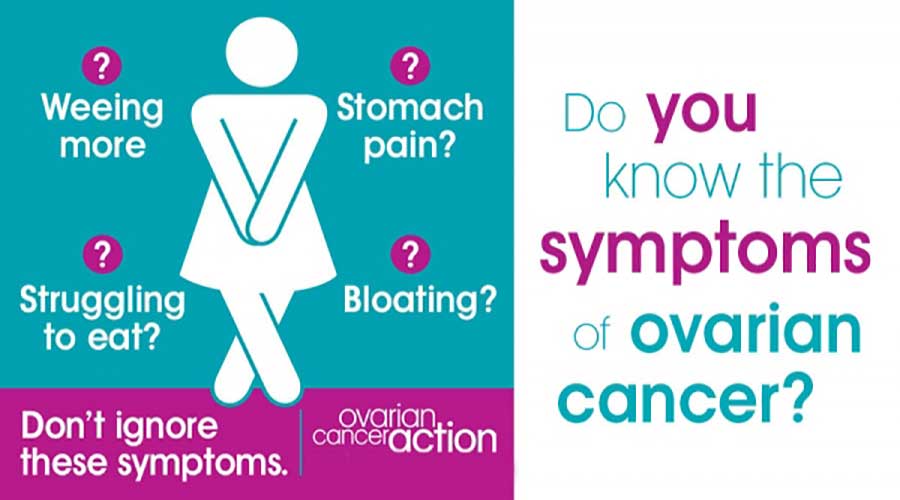
Introduction
It's the fifth most common cancer among women after breast cancer, bowel cancer, lung cancer and cancer of the uterus (womb).
Ovarian cancer is most common in women who have been through the menopause (usually over the age of 50), although it can affect women of any age.
As the symptoms of ovarian cancer can be similar to those of other conditions, it can be difficult to recognise. However, there are early symptoms to look out for, such as persistent bloating, pain in the pelvis and lower stomach, and difficulty eating.
It's important to see your GP if you experience these symptoms, particularly over a long period of time.
The ovaries are a pair of small organs in the female reproductive system that contain and release an egg once a month. This is known as ovulation.
Different types of ovarian cancer affect different parts of the ovaries. Epithelial ovarian cancer, which affects the surface layers of the ovary, is the most common type. This topic focuses on epithelial ovarian cancer.
What causes ovarian cancer?
The exact cause of ovarian cancer is unknown, but certain things are thought to increase a woman's risk of developing the condition, such as age, the number of eggs the ovaries release and whether someone in your family has had ovarian or breast cancer in the past. However, only 1 in 10 cases of ovarian cancer has a genetic link.
Treating ovarian cancer
The treatment you receive for ovarian cancer will depend on several things, including the stage of your cancer and your general health. Chemotherapy is the main treatment for ovarian cancer, but your treatment will usually involve a combination of surgery and chemotherapy.
Overall, 72 out of every 100 women (72%) will live for at least one year after being diagnosed with ovarian cancer. Around 46 out of 100 (46%) women will live for at least five years, and about 35 out of 100 (35%) will live for at least 10 years. However, women with advanced ovarian cancer have a poorer survival rate.
As with most types of cancer, the outlook for ovarian cancer will depend on the stage it's at when diagnosed – that is, how far the cancer has advanced. The Cancer Research UK website has more information about the outlook for ovarian cancer.
Being diagnosed with ovarian cancer can affect daily life in many ways. However, support is available for many aspects of living with ovarian cancer, including emotional, financial and long-term health issues.
Ovarian cancer screening
There are methods of screening for ovarian cancer but, currently, they haven't been fully tested. Screening is only available for women who are at high risk of developing the condition due to a strong family history or inheritance of a particular faulty gene. Clinical trials in the UK are currently being carried out to assess the effectiveness of screening in high-risk women and in the general population. A cervical screening test, which used to be called a smear test, can't detect ovarian cancer.
If you’re suffering from infertility; If you’ve given up your hope for finding proper treatments, then you should Know that, having the best medical experts and facilities, Iran is the best place to see; your solution.
If you’re concerned with your beauty , but financial issues are keeping you awaay from acting on it, keep in mind that Alale company present the best experts as wellas the best and most reliable beauty centers in Iran.
Submit Comment